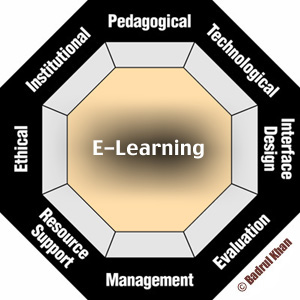The E-LEARNING Framework

- The pedagogical dimension of E-learning refers to teaching and learning. This dimension addresses issues concerning content analysis, audience analysis, goal analysis, media analysis, design approach, organization and methods and strategies of e-learning environments.
- The technological dimension of the E-Learning Framework examines issues of technology infrastructure in e-learning environments. This includes infrastructure planning, hardware and software.
- The interface design refers to the overall look and feel of e-learning programs. Interface design dimension encompasses page and site design, content design, navigation, and usability testing.
- The evaluation for e-learning includes both assessment of learners and evaluation of the instruction and learning environment.
- The management of e-learning refers to the maintenance of learning environment and distribution of information.
- The resource support dimension of the E-Learning Framework examines the online support and resources required to foster meaningful learning environments.
- The ethical considerations of e-learning relate to social and political influence, cultural diversity, bias, geographical diversity, learner diversity, information accessibility, etiquette, and the legal issues.
- The institutional dimension is concerned with issues of administrative affairs, academic affairs and student services related to e-learning.
ที่มา http://asianvu.com/bookstoread/framework/
คำสำคัญ (Tags): #e-learning#การเรียนรู้ผ่านสื่ออิเล็กทรอนิกส์
หมายเลขบันทึก: 258560เขียนเมื่อ 1 พฤษภาคม 2009 11:57 น. ()ความเห็น (2)
Thank you so much, my teacher. :)
- เข้ามาเรียนรู้ครับ
- อาจารย์สบายดีนะครับ
- ขอบคุณครับ